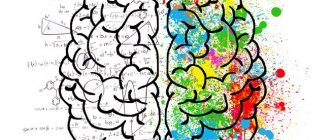The inability to maintain attention negatively affects professional success and personal life. Absent-mindedness, forgetfulness, and constant loss of context bring discomfort into the life of a person and his loved ones.
If you're striving to achieve ambitious work goals, inattention can become a barrier. Noticing a decrease in concentration and memory deterioration, a person may panic - behold, my cognitive abilities are deteriorating! However, absent-mindedness does not always indicate cognitive impairment. Often the cause of forgetfulness is stress, endocrine diseases, psychological barriers, etc.
To get rid of absent-mindedness, you need to determine its root cause. It’s good if we can rule out pathologies. If you fail, then you will know what exactly requires your attention, what process in the body needs to be established and restored in order to regain mental acuity, attentiveness, and concentration.
In this article we will look at the main causes of absent-mindedness in adults, talk about how diagnostics are carried out, and how we can prevent deterioration of attention and memory. The expert in this material is Ekaterina Nikolaevna Kozlova, gynecologist, endocrinologist, nutritionist.
Causes of poor concentration
If absent-mindedness has appeared in your life, this phenomenon can have a variety of reasons. One of the most common is stress , overwork, lack of sleep. In other words – accumulated fatigue. Working on an irregular schedule, a constant sense of responsibility for work processes, exciting moments in communication with colleagues and contractors - all this drains the body's resources. It takes more and more time to regain strength. Without the ability to truly disconnect from work, a person walks in circles, accumulating fatigue. The result is a broken state, difficulties associated with reasoning and correct construction of sentences. Overwork is accompanied by inattention to details and forgetfulness. A person often begins to make mistakes when performing work tasks, fall out of context, forget about promises, etc.
A common cause of absent-mindedness in adults is age . After 55-60 years, many women and men complain of a noticeable decrease in concentration and memory deterioration. These conditions do not arise overnight, but, unfortunately, patients turn to doctors in an already very advanced state. With age, the number of neurons decreases, connections between nerve cells become weaker, which leads to problems with memory and attention. The more varied, rich (intellectually, physically, emotionally) a person’s life is, the less chance there is for developing serious memory impairments.
Other causes of absent-mindedness are various diseases . Neurological, endocrine, cardiovascular, and psychiatric pathologies can cause memory and perception disorders. Memory may deteriorate after traumatic brain injury or viral diseases. People with alcohol addiction often experience memory impairment.
Kozlova Ekaterina Nikolaevna
★ ★ ★ ★ ★
Chief physician of the clinic
These symptoms are familiar to every person. It is necessary to differentiate whether this is due to a large flow of information or is it still a manifestation of some pathological health condition. If these symptoms do not go away during the weekend, then this is a reason to contact a specialist who can recommend a minimum clinical and laboratory examination and give recommendations on lifestyle.
Sign up for a consultation
What symptoms in your baby’s behavior should you pay attention to?
Symptoms directly depend on the character and age of the child, his environment and rules of behavior in the family, as well as on the severity of the disorder itself.
Parents should be alert if their baby:
- is unable to maintain attention for a long time during school or homework;
- undisciplined, restless and careless;
- understands words and phrases poorly or does not seem to hear them;
- cannot control himself, is distracted by trifles when performing a task;
- has a tendency to create disorder and chaos on his desk, scattering things and toys;
- forgetful;
- absent-minded, often loses personal belongings;
- has obvious difficulties in following the rules;
- has problems communicating with adults and/or peers;
- impatient and intrusive;
- constantly interrupts the interlocutor, cannot listen to the end;
- difficult to perceive new information;
- has an anxious personality type and is prone to mood swings;
- has difficulty writing, confuses letters;
- constantly spinning around in class, talking, gesticulating;
- does not finish what he starts.
It is important to monitor the child, and at the first signs that appear, begin to pay special attention to him.
Types of Concentration Problems
There are four main types of this syndrome:
- True absent-mindedness
The definition of “true” implies the absence of any topic for concentration and reflection. The person literally doesn't focus on anything. This condition can lead to dangerous situations – for example, if a person does not watch the road while driving.
- Imaginary loss of attention
It occurs in cases when a person is very passionate about some thought, idea, and cannot concentrate on anything other than it. Also, an imaginary decrease in attention is characteristic of dreamers. Having his head in the clouds, a person becomes inattentive to the world around him and events.
- Student absent-mindedness
Attention disorders in children are common. This is usually a sign of attention deficit disorder, which can be easily corrected by a competent specialist. Student absent-mindedness manifests itself through a constant shift in the vector of attention: the child cannot concentrate on performing one task, being distracted by irritating factors or lost in his own thoughts.
- Senile absent-mindedness
As we mentioned above, age invariably entails a decrease in the number of neurons and a weakening of the connections between them. As a result, older people have a harder time absorbing information and have a harder time concentrating for long periods of time. They may lose the thread of the conversation and “fall out” of the conversation.
SRS - what kind of syndrome is it?
Absent-mindedness is a reduced ability to perform goal-directed activities. In simple terms, absent-mindedness refers to a lack of concentration. The disorder manifests itself as forgetfulness and inattention. This could be a personality trait, a symptom of an illness, or a temporary state of fatigue.
In our country, about 15 percent of schoolchildren suffer from RTS. Typically, parents and teachers notice the first signs between the ages of 3-9 years.
Absent-mindedness as a symptom of illness
Absent-mindedness is one of the signs of a number of diseases or other conditions associated with impaired functioning of the body. Below are examples of several diseases/conditions accompanied by absent-mindedness:
- Depression.
Many patients describe depression as a state of not wanting anything. Such depression is accompanied by inattention to the surrounding world and increased fatigue when trying to concentrate.
- Anxiety disorders.
Anxiety disorders, especially those associated with obsessive thoughts, prevent a person from paying enough attention to study, work, and other important tasks.
- Alzheimer's disease.
Patients with Alzheimer's disease experience severe problems with memory and attention. They may forget what they were told recently, not notice, not remember what is happening around them.
- Adrenal exhaustion.
This and other endocrine pathologies affect cognitive functions. They can cause forgetfulness and absent-mindedness. Often it is not elderly people who complain of memory impairment, but women of perimenopausal and menopausal age. This is due to changes occurring in a woman’s body.
- Withdrawal syndrome (with abrupt termination of taking medications).
Abruptly stopping medication can cause a deterioration in attention and concentration.
- Withdrawal syndrome in smokers
Smokers like to say that nicotine kickstarts their thinking process and helps them get their act together. When you suddenly quit smoking, your blood sugar levels drop significantly, which leads to weakness, dizziness, and inattention.
MIGUNOVA ANASTASIA ANDREEVNA
Cosmetologist
Initial consultation: RUB 4,500
Make an appointment with a doctor Instagram
VYATKINA IRINA SERGEEVNA
Gynecologist-endocrinologist
Initial consultation: RUB 8,500
Make an appointment with a doctor Instagram
KALININA EKATERINA ALEXANDROVNA
Cosmetologist
Initial consultation: RUB 4,500
Make an appointment with a doctor Instagram
KOZLOVA EKATERINA NIKOLAEVNA
Gynecologist-endocrinologist, oncologist
Initial consultation: RUB 5,000
Make an appointment with a doctor Instagram
Reviews
Tatiana
I am happy to be among your guests at the clinic, I enjoy our communication, I am grateful for your super professionalism, for giving beauty and a sense of confidence in your professional actions, protection from “age-related changes”











